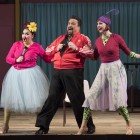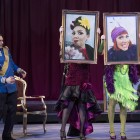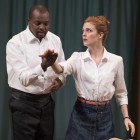Cenerentola 2017Opera North
Read more about the opera Cenerentola
At OperaScotland we generally try to chronicle the activities of Scottish companies wherever they perform. We also record performances in Scotland by visiting companies - a recent example being the trip of Opera North to Edinburgh with excellent stagings of Billy Budd and a Puccini double-bill.
- We have not so far featured performances outside Scotland by non-Scottish companies. However, as it is within our remit to encourage opera-going in all its forms, it seems logical that we should include Newcastle-upon-Tyne as a performance venue. It is a convenient destination for Scots in the borders and Edinburgh area to visit, and many do that from time to time.
The current season of Opera North spotlights three contrasting operas derived from folk or 'fairy' tales. While each production has a different director, a decision has been taken to use one set, the components of which can be re-arranged easily. An added advantage of this quick change is to allow the introduction of a Saturday matinee. While two of these operas, Hansel and Gretel (Humperdinck) and La cenerentola (Rossini) can be classed as popular favourites, the third, Rimsky-Korsakov's Snow Maiden, is a great rarity and well worth catching in Newcastle itself or later at Salford, Belfast or finally Nottingham.
The director, Aletta Collins, has a background in dance, so it was perhaps no surprise to find that Don Magnifico runs a dance school - the overture shows the young customers at work, the set has a mirrored wall and a movable barre. The set for the ball at Ramiro's palace was clearly backstage at his little Court Theatre, allowing us to see the unpainted backs of the previous set - a clever use of enforced economy. There was little more by way of dance until the finale, when the family reconciliation is signified by the stepfather leading the heroine in a few tentative steps - whereupon she proves a 'natural' to the point where she throws off a casual pirouette in the middle of singing her final rondo.
Overall this was a hugely enjoyable way to spend a Saturday afternoon. Collins ensured that all the characters were fully three-dimensional humans, rather than the clockwork toys they sometimes seem like. Even Clorinda briefly acknowledges the genuine beauty of the mystery guest, before cheerfully joining her sister in defacing the various portraits of rival ladies on display. Dandini clearly becomes smitten by the heroine, and even Alidoro is a more humane and indulgent character than he sometimes appears - his changes of guise include a brief turn as a priest in charge of the register. Costumes were largely mid-twentieth century - debutante frocks for the chorus girls. But the sisters' ball dresses were different, actually designed to suit them - twenties flapper for Clorinda, Hispanic tango outfit for Tisbe. Magnifico's tracksuit seemed to put some audience members in mind of a local football manager. Dandini and Ramiro's swapping of outfits was made much of.
The singing was of a uniformly high standard, led by two newcomers. Sunnyboy Dladla is building a reputation as a stylish Rossinian in continental houses, and his Ramiro showed why - a well-schooled, open Italianate sound, with all the runs and high notes voiced with absolute confidence. Wallis Giunta, in the title role, may not have the deep contralto tones with which the part is generally associated, but the low notes were all there without any sense of forcing, and her entire performance was delightful. The others gave excellent support, with serious aspects of the buffo characters brought to the fore, not shirking the nasty elements - Magnifico didn't just try to fool the visitors into thinking Angelina dead, but was quite willing to knock her around a bit.
The conductor, David Cowan, was scheduled to do the final Leeds performance plus the two in Newcastle. This was therefore his third - all others being taken by the familiar figure Wyn Davies. On the whole Cowan directed a stylish account of the score - the ensembles certainly had the requisite fizz. The first act finale did perhaps have too much volume from the flute/piccolo section - much calmer in the storm fortunately. One oddity did seem to be the orchestration used - Cenerentola was one of the first of Rossini's major works to benefit from modern research that resulted in a cleaned up and more authentic score. Alberto Zedda's edition was conducted by Claudio Abbado as long ago as the 1971 Edinburgh Festival, but here it seemed we were given more prominent brass notes than are usually heard nowadays.
The production opened at Leeds Grand Theatre on 16 February, with further performances on 18, 21, 23 and 25 February. On tour the dates are Newcastle 2 and 4 March; Salford 9 and 11 March; Belfast 16 and 18 March; and Nottingham 23 and 25 March.
The schedule for the Newcastle visit, starting Wednesday 1 March is: Wed Hansel and Gretel; Thu Cenerentola; Fri Snow Maiden; Sat mat Cenerentola; Sat eve Hansel and Gretel. The order of performance is identical at the later venues.
Performance Cast
- Clorinda daughter of Don Magnifico
- Tisbe Clorinda's sister
- Angelina known as Cinderella, Magnifico's stepdaughter
- Alidoro Ramiro's tutor, a philosopher
- Don Ramiro Prince of Salerno
- Don Magnifico Baron of Montefiascone
- Dandini the Prince's valet












